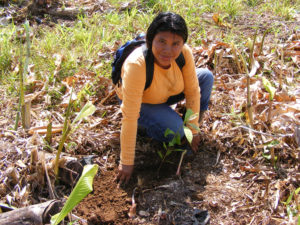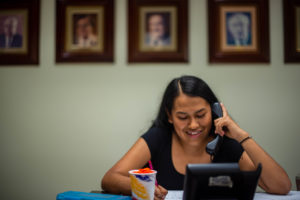Courageously indigenous
I am Ngäbe-Buglé, and I believe in the transformative power of education.
During her youth, Elizabeth Zurdo (’15, Panama) walked two hours to get to school – traversing mountains through either torrential rain or intense sun and inescapable humidity. Despite the difficulties, she was willing to make sacrifices. She craved forward momentum and the freedom to dream, and she trusted her feet to take her wherever she wanted.
Elizabeth belongs to the Ngäbe-Buglé tribe from Panama’s Kodrini region. Like the women of her village, she wears nawas, brightly colored dresses featuring embroidered waistlines and shoulder cuffs. She also wears the pride of her indigeneity. She is a woman who honors her roots and seeks to protect and preserve her culture, her aboriginal cosmovision.
When Elizabeth finished elementary school, her family had to move to another town so she could advance into high school. Her mother, a busy caregiver to five children, encouraged Elizabeth to study voraciously, recognize the opportunity in every challenge, and endeavor to grow as an independent woman. For three years, after graduating from an agricultural high school, Elizabeth studied computer engineering at a nearby university. She felt uninspired and dissatisfied with her higher education – until she learned that, at EARTH University, she could be prepared to become a leader while promoting the welfare of her people.
Still, she was uncertain about applying; no indigenous woman she knew had ever studied abroad. She worried she would not succeed, that she would face innumerable cultural barriers that might thwart her progress. She worried about leaving behind her 3-year-old daughter.
Elizabeth fought past her fear, choosing instead to see the inherent opportunity. During four years at EARTH, she gained the skills to return to her community and be an example to others. Today, she works with Panama’s Ministry of Education, teaching environmental education and entrepreneurship courses to indigenous youth.
“A few days ago, I published on WhatsApp a photo from my university internship in Nicaragua, and all my students asked how I managed to travel, leave the country, and study in other places,” Elizabeth recalls. “They’ve been asking me how they can continue studying and do the same. I tell them that they will struggle, that sometimes things will not be easy, that they will have to pass through difficulties to reach their goals – but that all this will help them grow.”
In her community, quality education is still difficult to access, women continue confronting age-old stigmas and enforced gender roles, and young people who yearn to study often have to migrate to the cities. However, Elizabeth remains upbeat, confident that the Ngäbe-Buglé have the tools to move forward and that, by working together, they will further improve their own lives.
I am Miskito, and I fight for the sovereignty of indigenous territories.
Norvin Goff Salinas (’06, Honduras) arrived at EARTH with a clear objective: to be trained as an agricultural engineer and then return to his country to build community projects, support the political formalization of the Miskito people, and deepen their involvement in public policy. Since returning to Honduras in 2006, Norvin has worked unceasingly for his people and his region. For years, he has served as president of MASTA, the Miskito Federation.
“Among the positive outcomes that I have achieved with my people is obtaining a collective title to our territory, with almost 1.5 million hectares reserved for our communities,” Norvin says. “We are constantly fighting against the illegal occupation of our land by settlers, and that’s why it’s vital I prepared myself as a leader at EARTH.”
The education Norvin received at EARTH nurtured his ability to lead. He says when he first arrived at our Guácimo Campus, he thought he would have trouble adapting to such a diverse environment. To his surprise, he quickly forged connections with classmates from all over the world, including other students from Latin American indigenous communities. These fruitful interactions expanded his technical knowledge of agricultural issues, enabled him to devise innovative plans for his own community, and allowed him to promote the social struggles of the Miskito people.
“The EARTH model is multidisciplinary; it was concerned not only with teaching me the productive part of business – but also with my human and social development,” Norvin says. “All of this served to expand my vision of what I really wanted to achieve, and how it could benefit the common good.”
In recent months, the fragility of the food, health, and education systems within indigenous communities has become more visible. According to Norvin, it is critical to seek solutions rooted in their unique worldviews. As federation president, he works to solve immediate problems, such as recurrent flooding of riverbanks due to climate change, which can spoil farmers’ crops (especially rice) and thereby exacerbate hunger. In response, he is investigating strategies and alternatives that will safeguard the well-being of all people in the area.
I am Nasa, and I lead the positive transformation of my community.
To receive a primary and secondary education, Lesly Durango Rivera (’22, Colombia) had to relocate from Huellas de Caloto Indigenous Reservation – her village in northern Cauca Province, a region long afflicted by the nation’s armed conflict – to the nearest city. As a teenager, Lesly lived alone, far from the comfort and security of her family. But she was determined to get a quality education. Since childhood, she has wanted to become a leader, one who could usher in positive change for the Nasa people – and indigenous women as a whole – because, oftentimes, opportunities do not come as easily to native communities.
When Lesly applied to EARTH, she noticed some apprehension bubbling up: a feeling of vulnerability stemming from speaking a tribal language, dressing differently, and having a distinct worldview. However, upon notification of being admitted, she knew she was taking a major step forward.
“The education I receive at EARTH has greatly helped me to develop my leadership. I feel stronger now. I want to return to my community to demonstrate all these abilities that now characterize me as an indigenous woman, and I want to do it through projects that enable my people to gain food sovereignty within the territory,” Lesly says. “In the same way, I wish to collaborate with others to secure fairer trade of products. When you live in a village like mine, you notice the immense effort that campesinos put in, but when the products go through intermediaries, they don’t get paid justly for it.”
In the future, Lesly will face big challenges from the ongoing civil conflict in Colombia, which causes the area’s native people to live in fear and lack opportunities. To successfully implement her intended projects, she is working to hone her assertiveness and persuasive-communication skills. She will need people back home to recognize how diverse, sustainable agriculture will benefit them – and that growing legal crops can earn them a healthy profit.
“EARTH graduates are agents of change. And I am ready to make change, to support indigenous communities in their struggles. Community leadership is the solution to our problems, and it’s possible,” Lesly adds. “I am ready to be a role model for other women, for them to see me as an example – so they, too, can achieve their dreams.”
Elizabeth, Norvin, and Lesly are part of EARTH, an inclusively multicultural and empathetic educational community that prepares young leaders like them, people who work tirelessly toward a society in which everyone has access to a better quality of life and more opportunities for growth.
We at EARTH University are proud of how they defend their heritage, their natural resources, and their autonomy.











